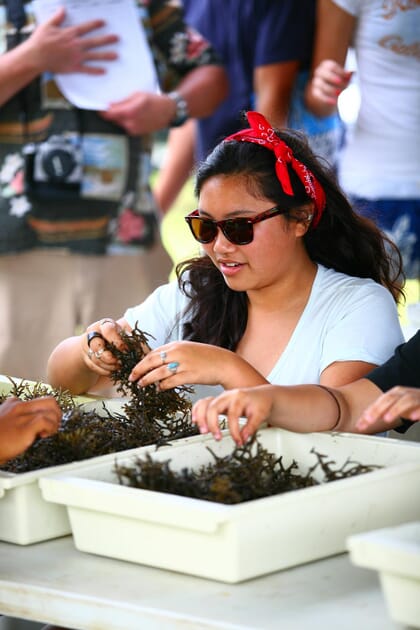
The grant will support student-led research that addresses limu-related issues important to Native Hawaiian people, advancing the knowledge base surrounding limu ecology and production
Created and managed by Windward Community College, the Kiaʻi Loko Centre for Limu Research has been awarded the grant from the National Science Foundation’s Tribal Colleges and Universities Program (TCUP).
The centre focuses on applying traditional Native Hawaiian knowledge alongside Western scientific methods to study questions important to Native Hawaiians about limu – which was almost wiped out in the wild by decades of overharvesting and competition from non-native macroalgae species – and the traditional Hawaiian fishpond. Aquacultural practices employed in maintaining healthy fishponds and producing limu are essential aspects of traditional Native Hawaiian lifestyles that contribute to critical contemporary issues, such as food security, biodiversity and cultural perpetuation.
The five-year objectives are to partner with community members, Native Hawaiian cultural experts and STEM professionals in engaging 120 Native Hawaiian high school and college students in culturally relevant STEM courses, student internships and the completion of STEM certificates that prepare students for positions as aquaculture technicians.
“The limu centre builds on the strengths of our Windward side – our community and how we practice laulima (cooperation) to grow our ‘ōpio (young people). Together with our high schools, Pacific American Foundation, Waimānalo Limu Hui, Sea Grant and others, we will grow science that is pili (connected) to who we are and impactful for those we love,” said chancellor Ardis Eschenberg in a press release.
In recent years, interest in algae cultivation has risen for uses such as renewable biofuels, nutraceuticals, human foods, nutritional supplements, livestock and aquaculture feeds, wastewater clean-up and carbon dioxide sequestration. In addition, algae culture promises to support the development of new industries for the state of Hawaii.
“The Kiaʻi Loko Centre for Limu Research will train students to work in an important emerging industry promoting sustainability and self-reliance in these islands,” added Dave Krupp, dean of sciences at Windward CC. “Working with our partners, we will serve our Koʻolaupoko and Koʻolauloa communities to solve issues of concern such as the restoration of native limu to our reefs and elimination of invasive seaweeds.”
According to a recent survey, there is a significant need in the US for a trained algae-based workforce in both the algae farming and biomanufacturing sectors. And because Hawaii has a unique position in algae cultivation – such as relatively consistent warm temperatures, sunshine, cold deep nutrient-rich ocean water and limited traditional farming resources – most of these algae-based jobs are projected to be located in Hawaii.
“This [grant] is recognition that place-based education can create nationally recognised opportunities for our kids. We have the means and the talent to compete at the highest levels,” concluded Senator Jarrett Keohokalole.
The Kiaʻi Loko Centre for Limu Research has two primary goals:
- advancing cross-disciplinary knowledge of aquaculture and limu ecology in support of community needs; and
- training the next generation of Native Hawaiian STEM professionals knowledgeable in aquaculture and limu ecology.
With these goals in mind, Windward Community College is creating an algae culture pathway as a certificate of competence within the Agripharmatech Certificate of Achievement, providing opportunities to generate a skilled workforce for algae-based bioproducts and other related fields, such as wastewater treatment, biotechnology and multi-trophic aquaculture. This will also serve as a pathway for higher-value credentials and transfer to four-year institutions.
For more information on the grant and Windward Community College's new algae culture pathway, contact Dave Krupp.




